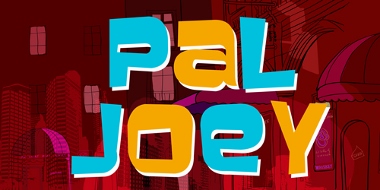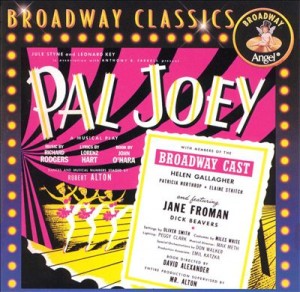YOUR PAL IS COMING TO TOWN
Sassy and brassy Pal Joey is a wondrous rouser that spins the tale of a roué gone rotten in Depression-era Chicago. As part of its Reiner Staged Reading Series, Musical Theatre West is presenting Rodgers and Hart’s original 1940 version of their masterwork, and I promise a glorious revival at CSULB on Sunday, January 24 at 7. With a 14-piece orchestra conducted by Ryan O’Connell, you can expect rich justice will be given to Rodgers’s still-hip score. While scripts may be in hand, there is still choreography, suggested costumes, and ’” based on previous MTW outings ’” a captivating cast to rival any Broadway production.
Pal Joey is the kind of Horatio Alger plot that George M. Cohan could write in his sleep: Earnest American underdog works hard and makes good. Except in Rodgers and Hart’s deadpanning version of these sardonic short stories by John O’Hara, the underdog is no plucky Little Johnny Jones. He’s Joey Evans, a womanizing cad with a foul mouth, a small brain, a big ego, and an overactive crotch: The frank O’Hara puts it all in Joey’s hard-boiled mouth: “As Walt Whitman said, `Love is a 2 by 4.’” And Joey sure doesn’t make “good.” Hiding very little talent under a lot of looks, he’ll sponge off any woman who’ll bankroll him into bed ’” and he’ll dump her when he clears a profit.
Except it doesn’t work this time. It’s 1939 and Joey (Adam Pellegrine) has wormed his way into Mike Spear’s (Tom Shelton) South Side joint where Mike warns him (in my favorite line): “Leave the drummer alone’¦he’s only a boy.” As the only headliner, hot-to-trot Joey tells terrible jokes, plays the drums, and romances the “mice” in the chorus. He also sways the particularly trusting and simple Linda English (Heather Lundstedt O’Neill), a hopeful who yearns for Hollywood and eats its fantasies. Poor Linda falls hard for Joey’s clumsy lies about growing up rich (“My mother breeded dogs” ’” “Oh, I’m so sorry,” murmurs Linda), then losing it all, presumably so he can earn it on his own. It’s the American Dream, though Joey intends to cut a lot of corners.
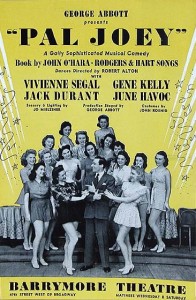 The symbol of everything Joey covets, married socialite Vera Simpson (Mary Gordon Murray), accidentally wanders into Mike’s gin joint. Yearning to slum it, this dynamic doyenne falls for Joey’s insults, becomes his sugar mommy, orders him to drop shop-girl Linda, sets him up in a plush love nest (“Den of Iniquity”), and subsidizes Chez Joey, his fantasy dream North Side club, its dubious glamour conveyed in a “dream ballet” delivered three years before Agnes DeMille’s famous choreography in Oklahoma!
The symbol of everything Joey covets, married socialite Vera Simpson (Mary Gordon Murray), accidentally wanders into Mike’s gin joint. Yearning to slum it, this dynamic doyenne falls for Joey’s insults, becomes his sugar mommy, orders him to drop shop-girl Linda, sets him up in a plush love nest (“Den of Iniquity”), and subsidizes Chez Joey, his fantasy dream North Side club, its dubious glamour conveyed in a “dream ballet” delivered three years before Agnes DeMille’s famous choreography in Oklahoma!
Of course Joey overplays his hand, and allows Vera to be black-mailed by the venal double agent Ludlow Lowell (Gabriel Kalomas), whose abetting chorus girl ’” the all-singing, all-dancing, all-knowing, all-wisecracking Gladys Bumps (Natalie Nucci) ’” mistrusts Joey on sight. The evening’s biggest tour-de-force is the transformation of Melba (Kim Huber), a mousy reporter who never takes notes because they get in the way of her story, into the all-revealing incarnation of pseudo-intellectual stripper Gypsy Rose Lee in the marvelous show-stopper, “Zip.” Stylishly as always, Vera kicks him out on his busy tush. But, neither sadder nor wiser, Joey resumes his old con game, taking the el train into a well-deserved oblivion.
Which explains in a big way why Pal Joey attracted adverse reactions big time in 1940. An “unlikable” central character in a musical was practically unheard of; Brooks Atkinson of The New York Times called it “odious,” and went on to ask, “Although it is expertly done, can you draw sweet water from a foul well?” Even with 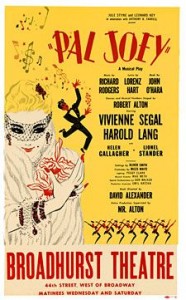 a cast that included Vivienne Segal, June Havoc, Van Johnson, future film director Stanley Donen, and Gene Kelly as Joey (his first and only Broadway leading role), the show wasn’t as successful as it deserved to be. Still, there was a rabid core of fans who maintained that Pal Joey was “before its time.”
a cast that included Vivienne Segal, June Havoc, Van Johnson, future film director Stanley Donen, and Gene Kelly as Joey (his first and only Broadway leading role), the show wasn’t as successful as it deserved to be. Still, there was a rabid core of fans who maintained that Pal Joey was “before its time.”
It seemed for a decade that this show, which had no original cast recording, was doomed to oblivion. Then one of the shows many great songs, “Bewitched,” became a hit in 1950, with seven different versions reaching the national charts, five in the Top 10. The craze persuaded Goddard Lieberson at Columbia to make a studio recording of the score, bringing back Segal and adding bigtime Broadway hoofer Harold Lang, still hot from playing Bill in Cole Porter’s Kiss Me, Kate, as Joey. The album (re)introduced even more songs to the public, such as “I Could Write a Book.”
Soon after, the composer Jule Styne saw Bob Fosse as Joey in a summer stock production, and raised the money for a Broadway revival starring Segal and Lang. The show ’” with a supporting cast that included Helen Gallagher and Elaine Stritch ’” was a hit, running 540 performances, the longest of any musical revival in 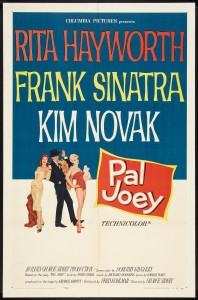 the history of American theater up till then. The success prompted an Original Cast album, but ironically Segal and Lang were “unavailable,” so the leads were sung by Jane Froman (who was played by Susan Hayward in the film biography With a Song in My Heart) and a young leading man named Dick Beavers.
the history of American theater up till then. The success prompted an Original Cast album, but ironically Segal and Lang were “unavailable,” so the leads were sung by Jane Froman (who was played by Susan Hayward in the film biography With a Song in My Heart) and a young leading man named Dick Beavers.
I saw a production in Chicago last year, and I’m baffled why this is a rarely produced musical. One reason my be the 1957 film version with Frank Sinatra, Rita Hayworth and Kim Novak. The movie gives the plot a happy ending, cuts half the score, and shoehorns in Rodgers and Hart tunes from other shows. The stage version is far superior, which you’ll discover thanks to Musical Theatre West and producers Michael Betts and David Lamoureux. Directed by Daniel Smith, the cast includes Jonathan Arana, Marisa Field, Annie Hinskton, William Martinez III, Theresa Murray, Jane Papageorge, and Jon M. Wailin.
Pal Joey
Musical Theatre West
part of the Reiner Staged Reading Series
University Theatre at CSULB (corner of 7th and East Campus Drive)
Sunday, January 24, 2016 at 7:00
for tickets (only 27 bucks!), call 562.856.1999 x4 visit MTW
